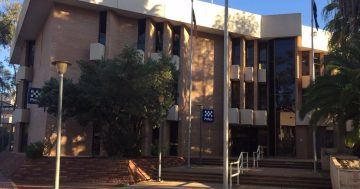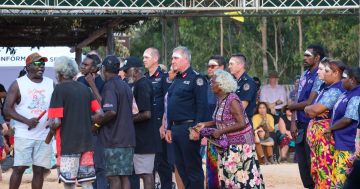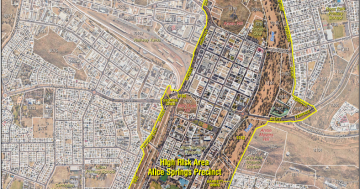
Corruption Commissioner Riches says the information was released due to its relevance to the Walker inquest, which is set to hear from NT Police Commissioner Michael Murphy for its last hearing on Wednesday (29 May). Photo: ICAC NT.
As the coronial inquest into the 2019 shooting death of Kumanjayi Walker entered its final stages, the Top End’s Corruption Commissioner said his police force investigation had uncovered more racist police ‘awards’ – “so offensive” they were unfit for public consumption.
Former NT police officer Zachary Rolfe shot Kumanjayi three times at close range in his home community of Yuendumu on 9 November, 2019. Mr Rolfe was acquitted of all charges in relation to Kumanjayi’s death in 2022.
During an inquest hearing in February, Mr Rolfe alleged there was a racist culture within the force’s specialist Territory Response Group (TRG).
Mr Rolfe alleged at the inquest that racist language was widely used throughout NT Police, including by high-ranking officers.
Mr Rolfe’s cited examples of alleged racism, including the issuing of racist ‘awards’, led to the launch of a joint investigation between the Office of the Independent Commissioner Against Corruption and NT Police in March.
On Friday (23 May), Commissioner Michael Riches said that since commencing the investigation they had obtained and reviewed an enormous body of documentary evidence. However, one briefing they received disclosed two ‘award certificates’ he claimed were “so offensive that I do not consider it in the public interest that they be circulated”.
This information confirmed for Commissioner Riches that racist awards had been produced in the TRG “at least in 2007”, which prompted him to issue a public statement calling for persons with firsthand information to come forward.
“That public statement, together with a request I made through lawyers for Mr Zachary Rolfe, has resulted in voluntary contact from more than 20 past and present members of the TRG,” according to the Commissioner. “Statements have been obtained from most of those individuals.
“I should acknowledge that those who have come forward have done so voluntarily. Many have given me information that is contrary to their own interests. Some have expressed regret and remorse for their past behaviours. Some have voluntarily provided me documentary evidence relevant to the investigation.”
While NT government systems did not allow the ICAC office to obtain records any earlier than 2015, the evidence collected from the period between 2016 and the present found “nothing to suggest that TRG awards were created or disseminated” that were, directly or indirectly, racist.
“While my investigation is not yet complete, the current state of the evidence suggests a significant shift in behaviours and attitudes in the TRG since 2016. Accordingly, great care should be taken to associate what might have been past behaviours and attitudes to those that appear to represent the present TRG culture.”
Commissioner Riches requested any individuals with new information contact his office by no later than 31 May, as it his intention to publish an investigation report as soon as possible.
These revelations added to the pressure on NT Police, after the government passed new curfew laws under the Police Legislation Amendment Bill 2024.
The Police Commissioner now has the power to enact a curfew for a maximum of three days, with the option to extend to a maximum of seven days if approved by the Minister for Police.
Among those criticising the bill was the NT Children’s Commissioner Shahleena Musk, who said she was not consulted prior to the bill’s introduction.
“There is a need to ensure these laws are balanced and proportionate,” Commissioner Musk said. “In order to do so, the NT Government must consult key stakeholders, including legal aid services, peak bodies and relevant oversight bodies, including myself and the Anti-Discrimination Commissioner.
“Rushing through laws that could lead to unequal restrictions on certain groups and increased contact with police can have devastating consequences.
“I am deeply concerned this legislation increases the likelihood of declarations that will target and harm vulnerable and marginalised groups, such as Aboriginal children and young people.”






